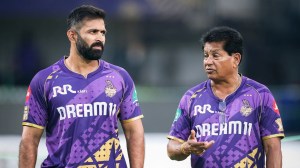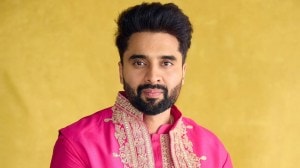Dad! Buy Me That!
Did you get this SMS? Shah Rukh Khan says, "Mere paas dhan hai, daulat hai, bangla hai, Yash hai, Karan hai, Aditya hai; tumhare paas kya ha...

Did you get this SMS?
Shah Rukh Khan says, “Mere paas dhan hai, daulat hai, bangla hai, Yash hai, Karan hai, Aditya hai; tumhare paas kya hai?”
Hrithik Roshan answers, “Mere paas baap hai”.
Even if you did get it, you probably couldn’t read it. Your peepers were tear-misted because you were overwrought watching Hrithik’s sweet, sad performance as the mentally different hero of Koi…Mil Gaya (KMG). “It’s my dad’s biggest budget so far,” says the born-again Golden Boy. ‘‘We slated for Rs 40 crore but with the cash crunch and all, we brought it down to 35.’’ While the hot and dusty plains of Hindustan clamour with the initial box office success of Hrithik’s resurgence after a very dry spell of four years and several loud flops, the long, lean hero with the Absolute Abs adds more masala to Bollywood’s long-simmering khichdi of Fathers and Sons, the perennial soap valourised in India ever since Ved Vyas scripted the world’s longest epic entertainer a few millennia ago.
On the night before he vanishes to Ladakh for Farhan Akhtar’s two-month Lakshya schedule, Hrithik’s pacing about a Delhi hotel like a caged panther. His distributors have told him to forget venturing out to a movieplex to savour crowd reactions. ‘‘But everyone else describes me as the one-film wonder,’’ he snaps. ‘‘Why don’t YOU ask me about it?’’ and rapidly drains two tall glasses of chocolate-flavoured protein drink as a post-gym tiramisu. Temper, temper.
The usually sweet-tempered hero credits his good behaviour to family values, growing up watching his father, Rakesh Roshan, struggle 20 years to make it, first as a (good but unhappening) actor and then as a (super-successful) director. ‘‘There was a time when Dad didn’t have 10,000 rupees to pay rent. We were literally kicked out and had to take refuge at my Nana’s,’’ reveals Hrithik. ‘‘I remember the night we were driving to Metro (cinema) for the premiere of Khudgarz. It was my dad’s first directorial venture. He and mom were in front, my sister Sunaina and I were jumping up and down at the back, making a big racket. Suddenly I noticed Mom had wet eyes. She asked dad, ‘If this film fails, where will we go?’ The rest of the drive was accomplished in total silence. I later found out that dad had put everything on the line—house, car, the works.”
Says father Rakesh, ‘‘Hrithik’s very disciplined and he doesn’t tell lies. Even now when I enter a room, if he’s seated with his leg folded, he puts it down. Since we stay in the same house, I’m always by his side when crises happen. Like when the Nepal thing broke out and was blown out of all proportion, I advised him to go talk to the media.’’
While this filial bond is pure and sweet as Cadbury’s cocoa, the whole world knows that the Salim-Salman Khan relationship is repeatedly tested by some very uncuddly episodes. The sins of commission, in true epic tradition, are always the son’s. “He doesn’t face me for a month. He sneaks away on shootings, parks his car secretly. But then he touches my feet and asks forgiveness,” says father Salim.
|
|
|
Salman doesn’t face me for a month. He sneaks
away on shootings, parks his car secretly. But then he touches my feet and asks forgiveness. |
|
|
But the co-inventor of the Angry Young Man says with tremendous dignity, ‘‘I haven’t been blind to Salman’s faults. I don’t publicly condemn him when something happens. But I make sure I take him aside and make him understand.’’ This Bollywood father, despite doing his expected duty in propping up his wayward son, retains the objectivity to admit, ‘‘I’ve realised there’s competition in every relationship except with your children. You will always want them to be more successful. For the first two years I helped Salman in his career. I won’t take credit for his acting, dancing or body-building. But he was naive, just out of college when he started and I helped him. When something wasn’t right, I placed a doubt in his mind and he took his decision. I firmly believe in giving children their freedom—you can’t teach them swimming in the drawing room, you have to let them go into the water.’’
However, Salman’s bête noire Vivek Oberoi seems to depend totally on daddy, going by father Suresh’s testimony: ‘‘Even when he used to fall down (as a child) he would call out daddy instead of mummy. I made him leave his Juhu school for Mayo College, Ajmer, though his teachers told me he would be head boy next year—I felt the school was like a pigeon-hole. When I was shooting with Ramgopal Varma, I didn’t have a drink, even though it was raining: I didn’t want to ruin my son’s career by one wrong word. I went on meeting Varma with his photographs until he liked them.’’
Curious. While Bollywood mythifies the mother as sacrificial goat, perhaps the ideal movie father in real life is one who will naak ragdo to set up his son. Ironically, such fathers are usually self-made men who want to spare their sons the ‘struggle’. Raj Kapoor comes promptly to mind. Randhir had a run of good films, as did Rishi. Both were launched superbly by their fathers. But Rajeev didn’t hack it since his debut did not coincide with his father’s creative peak. Those who grabbed a glance or two from Lady Luck: Sunil Dutt and Sanjay, Dharmendra and Sunny Deol. The one who famously didn’t: Kumar Gaurav.
Similarly, Ramesh Sippy whose films have earned him an assured place in Bollywood Baikunth, seems keen to underplay the ‘‘Daddy, buy me that!’’ syndrome with son Rohan: ‘‘He might have wanted to make movies but he never expressed it. I wished him all the best in his studies, but made sure he knew my doors were always open. I knew he wanted to make films when he joined me and one fine morning he said he had a script’’. The father’s sensitivity is offset by the son’s refreshing frankness: ‘‘He produced the movie (Kuch Na Kaho) for me to direct, there’s nothing greater than that!’’ Does the Sippy name help? ‘‘Totally! Absolutely! Without it I would never have got a chance in this industry. Everyone—Aishwarya, Abhishek—is giving me a chance because of this. Very few people get this kind of break’’.
But it’s Shobhaa De, Ultimate Bollywood Hot Mama, who cuts to the chase: ‘‘The intent has never varied since Raj Kapoor’s time. But now these dads are media warriors, they know how to pitch and peg their progeny. It’s all about making the son a brand, to encash the spin-offs from box office. There are megabucks out there in endorsements which can be negotiated by the father’’.
Oh, that profit motive. Ved Vyas must be smirking up there.
(With inputs from Shradha Sukumaran and Monica Bathija/Mumbai)






- 01
- 02
- 03
- 04
- 05

























